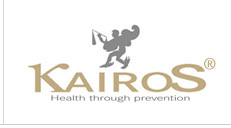| |
 TIPS for healthy eating ---------------------------------------------------------- TIPS for healthy eating ----------------------------------------------------------
• If you take up boring diets, you are bound to fail and will soon give up!
• If you are hungry, you can’t lose weight!
• If you eat too little, you will put on weight! If you want to lose weight, you must eat enough to
satisfy you!
• Food should nourish the body, giving it plenty of high quality fuel and protective agents, which it is capable of exploiting
• You should choose, combine and prepare food that tastes good, fills you up and doesn’t discharge much insulin in the body!
• Choose low calorie but filling foods containing plenty of roughage and micronutrients (vegetables, salads, fruit, wholegrain products, pulses such as beans, peas and lentils, asparagus, poultry, fish, seafood)
• Carbohydrates, protein and fat themselves don’t make you fat; excess calorie intake, a high blood insulin level and burning too few calories do!
• Eat no less, but also no more than 3 satisfying meals a day (breakfast, lunch, evening meal)
• If you need a snack in between meals: vegetables, fruit, nuts, muesli bars, tea, water
• Breakfast: complex carbohydrates (muesli, fruits, wholegrain bread, fruit juice), but no sausage/cheese/full cream milk products
• Lunch: light, tasty varied meal (without alcohol)
• Evening meal (5 – 7 p.m.): protein and vegetables, as little carbohydrate as possible
• Eat a varied diet and keep increasing your consumption of vegetables, salads, fruit and wholegrain products!
• The best sources of protein are: fish, game, chicken, turkey, curd cheese, yogurt, colourful vegetables
• Prepare your food intelligently and healthily: steam or braise rather than boiling or grilling
• Try and buy organically-grown, freshly-picked regional and seasonal products from local producers (farm shop, weekly market)
• Really healthy and varied protective packages include: all varieties of cabbage, pulses, beets, onions, citrus fruits, strawberries, cherries, peaches, apricots, lingonberries, blueberries, blackberries, nuts, herbs, spices, olives, garlic
• Choose vegetable fats (rapeseed, core, nut, olive, linseed, corn and soya oil), reduce your intake of saturated animal fats (fatty meat and sausages, full cream milk and cheese products, lard, butter, creamy sauces, dressings and marinades) and avoid solidified processed fats (biscuits, crackers, crisps, fried foods).
• Eat generous amounts of Omega-3-fatty acids (sea fish such as mackerel, herring, wild salmon, seafood)
• Eat slowly, chew your food well and savour it, celebrate and enjoy eating
• Consume 2-3 litres of water, tea or fruit juice with mineral water over the course of the day
• Before your main meal: have a large glass of water or a plate of soup
• Restrict your alcohol consumption (1 beer or 1 glass of red wine with your evening meal)
• Reduce your consumption of cooking salt to a maximum of 5 grammes per day. Select tasty sea salt in preference to processed cooking salt, which has no nutritional content. If you have a tendency towards high blood pressure, use especially sparingly or switch to low sodium healthy salt.
• If possible, avoid: products with a high content of refined or “simple” types of sugar (white
processed sugar=saccharine, maize syrup, fructose, maltose, dextrose) or artificial sweeteners, bakery goods (cakes, biscuits), crisps, white bread, large quantities of alcohol, fast food, pastries, sweet desserts, sweets, fizzy drinks, soft drinks, fruit nectars, syrups, fromage frais, processed food products and preserves.
• Why eat high-energy, low-nutrient processed products ("empty calories“) which only stress the beta cells in the pancreas and fill the fat reservoirs in the stomach?
• If you must eat chocolate, then choose dark chocolate with a high cocoa content (flavonoids, polyphenols), but don’t forget the other ingredients (cocoa butter, sugar, full cream milk) and the calories
• Eating is a sensual pleasure, but don’t switch off your common sense when enjoying it!
• Fats contain 9 kcal per gramme, alcohol 7 kcal, carbohydrates and protein 4 kcal each: the right mix and portion size make for healthy enjoyment!
• When you are shopping, carefully and critically read the list of ingredients and nutrition information on the food you buy!

 TIPS for healthy movement and physical activity --------------------------------- TIPS for healthy movement and physical activity ---------------------------------
• Buy a good quality pedometer and wear it all the time
• Walk at least 7,000 (preferably 10,000) steps a day, and a total of 70,000 a week
• Always take the stairs, avoid lifts and escalators, cycle instead of driving
• Stand up rather than sitting/lying down, walk and move rather than standing
• Seek out physical activities, actively reduce your comfort level
• At least 3 times a week, take at least 30-40 consecutive minutes of physical exercise (walking, hiking, swimming, using a cross-trainer or treadmill, swimming)
• 3 times a week, complete 15-20 minutes of strength training exercises (therapy bands, dumbbells, step machine, abdominal and back muscle exercises, rowing machine)
• At the weekend, schedule in at least 1-2 hours of endurance activities (hiking, tennis, golf, skiing, long-distance skiing, swimming, biking etc.)

 TIPS for managing and reducing stress ------------------------------------------- TIPS for managing and reducing stress -------------------------------------------
• Stress-reducing techniques (sport, hobbies, autogenic training, breathing techniques, meditation, progressive muscle relaxation, visualisation, yoga, tai chi, the 5 Tibetan rites)
• Maintain evening rituals (reading, music, tea, glass of red wine, walk)
• Get a good night’s sleep (7-8 hours, at least one of which should be before midnight)
• Restrict your alcohol and nicotine intake (increasing oxidative physical stress in the body doesn’t solve any problems!)

 TIPS for achieving a healthy lifestyle ------------------------ TIPS for achieving a healthy lifestyle ------------------------
• A healthy lifestyle is not a short-term event, but a way of life, a permanent fundamental move towards a consciously chosen new lifestyle.
• A positive lifestyle means consciously changing habits. This initially involves time, planning, expense and personal motivation. Knowing what to do and actually doing it are two different things; with the right attitude, you can meet the challenge.
• The opportunities and aims of a positive lifestyle are: health, wellbeing, energy, efficiency, vitality and inner satisfaction.
• Make small, gradual changes. Remain self-aware: these are pleasurable changes, which lead you away from your old habits towards a better lifestyle.
• Like everything in life, lifestyle is a question of viewpoint, perspective and mental attitude!

 Back to Overview Back to Overview
|




